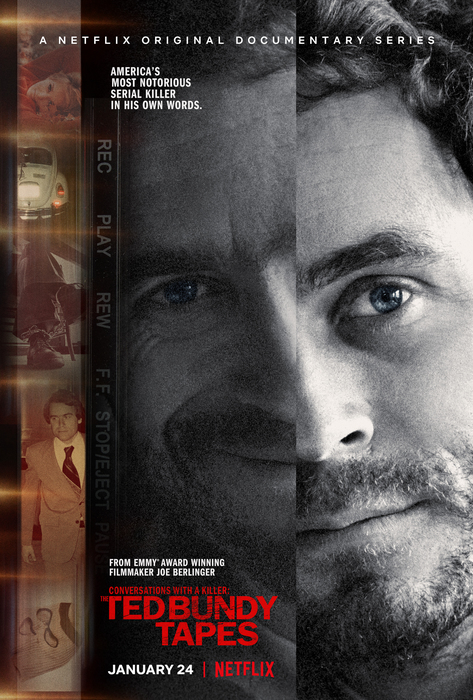Two Faced Killer: Examining Netflix’s Ted Bundy Documentary
Charming, smart, charismatic, evil, apathetic, and cruel. These are all contradicting words that can be used to describe infamous serial killer of the 70s—Ted Bundy. Bundy went undetected for years, but why and how could someone get away with such heinous crimes?
Reporter Stephen Michaud was writing a book about serial killers and had the opportunity to interview Bundy with a tape recorder, posing as an investigator for Bundy’s appeal case. The new Netflix series, “Conversations with a Killer: The Ted Bundy Tapes,” uses these interviews to tell the story in a new way while reviving an interest in one of the most fascinating serial killer cases in American history.
The first episode starts the series off slowly and gives a lot of background information. I was not hooked until they started to discuss Bundy’s personal life. I simply thought, “Well how can anybody ever say this guy is a charming, charismatic person? He murdered tons of women! He is vile!” The tapes made me see exactly why people say what they say about him.
The docu-series highlights Bundy’s charm and wit.
Bundy was considered an attractive man, which made him more appealing and seemingly safe to women. This is where the series really began to terrify me: the fact nobody believed it could be Bundy because he didn’t “seem” like the type to commit these crimes. There is even a recorded interview by Elizabeth Kloepfer, Bundy’s girlfriend at the time, with King County police about her concern of how her boyfriend could be the killer they were looking for, but Bundy did not fit the stereotypical profile of a serial killer.
The interview with his girlfriend at the time just blew me away. She called the police voicing a concern about Bundy, when the police were literally searching for an evil character named Ted, but they just kind of brushed it off. Bundy later discusses what a big systematic flaw that is by the police, and how that only encouraged him more than anything.
In one of the tapes, Bundy explains how he escaped jail the first time. He trained, in his jail cell, to jump out of a two-story window by jumping off his top bunk every night. He said being cooped up in a jail cell upset him and he claims the jail did not give him enough time outside, further using his master manipulation skills to make people sympathize for a killer.
After Bundy was found guilty for multiple crimes, the judge tells Bundy that he sincerely wished him luck on death row and wished he had gone down the right path so he could have practiced law in front of the judge, because he was so impressed with him. I hated hearing that. This man was just found guilty for murder, rape, and every crime in between, and the judge tells him that he is smart and witty. Even crowds of adoring women would show up to his trial, despite him being on trial for the murder of women. He was fascinating and interesting to listen to and watch, as much as I hate to admit that.
Michaud begins recording their conversation on death row, and Bundy at first does not budge, until Michaud says he is smart and should describe what a serial killer would do. Bundy describes in the third person what he thinks a serial killer would do, which eventually leads to him talking about his own crimes.
What I really enjoyed about this series was the use of Bundy’s actual voice. I found myself waiting to see the next picture or video and waiting to hear his haunting, yet intriguing voice. What was not so enjoyable was that waiting. There was much more talking from detectives who worked on the case, which of course is interesting and important, but I expected more from Bundy’s interviews (considering there is more than 100 hours of interviews). It is still a very good and informative watch regarding Bundy’s crime spree, especially for my generation because we did not live through it. That is what kept me so interested was the real, authentic footage.
To hear Bundy’s actual voice describe these crimes is truly frightening. He got away with these crimes not because of his intelligence, but because of his privilege. He was an attractive, educated, white man. A serial killer does not have to be the antisocial, lonely, undesirable person most people think of. The series ends with Bundy warning that killers live among us. They work with us. They go to school with us. No words have haunted me more than hearing the most despicable man say these words, knowing exactly that he knew while he was doing all those things, nobody flinched.
The editor may be reached at
[email protected]










